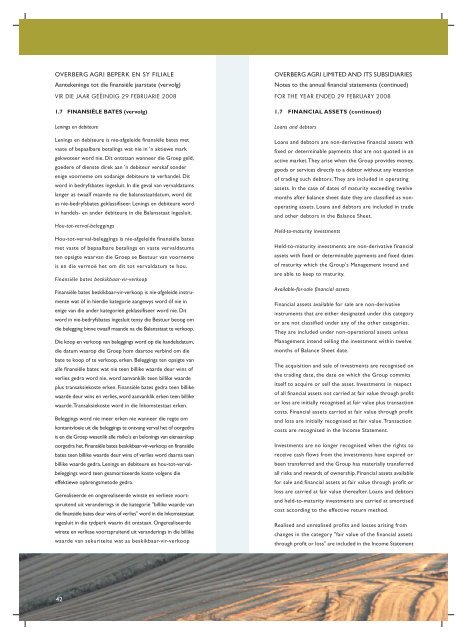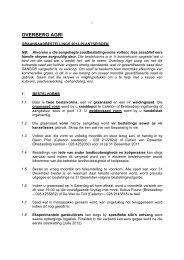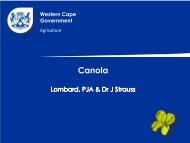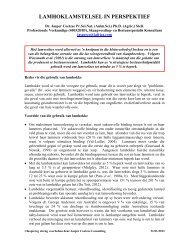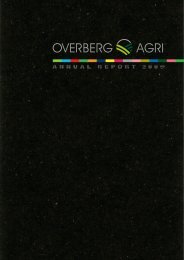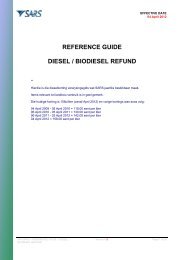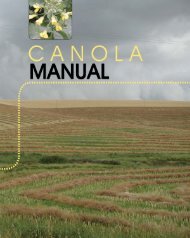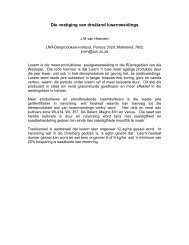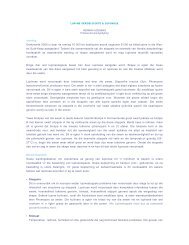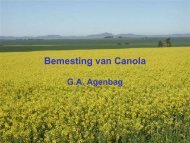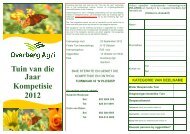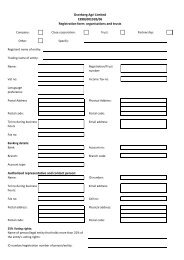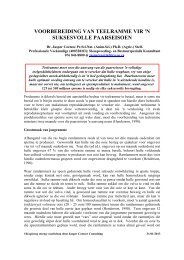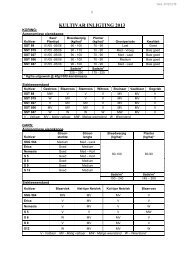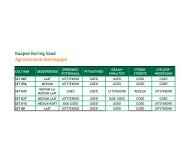2008 Finansiële Jaar - overbergagri
2008 Finansiële Jaar - overbergagri
2008 Finansiële Jaar - overbergagri
- No tags were found...
You also want an ePaper? Increase the reach of your titles
YUMPU automatically turns print PDFs into web optimized ePapers that Google loves.
OVERBERG AGRI BEPERK EN SY FILIALE<br />
Aantekeninge tot die finansiële jaarstate (vervolg)<br />
VIR DIE JAAR GEËINDIG 29 FEBRUARIE <strong>2008</strong><br />
1.7 FINANSIËLE BATES (vervolg)<br />
Lenings en debiteure<br />
Lenings en debiteure is nie-afgeleide finansiële bates met<br />
vaste of bepaalbare betalings wat nie in 'n aktiewe mark<br />
gekwoteer word nie. Dit ontstaan wanneer die Groep geld,<br />
goedere of dienste direk aan 'n debiteur verskaf sonder<br />
enige voorneme om sodanige debiteure te verhandel. Dit<br />
word in bedryfsbates ingesluit. In die geval van vervaldatums<br />
langer as twaalf maande na die balansstaatdatum, word dit<br />
as nie-bedryfsbates geklassifiseer. Lenings en debiteure word<br />
in handels- en ander debiteure in die Balansstaat ingesluit.<br />
Hou-tot-verval-beleggings<br />
Hou-tot-verval-beleggings is nie-afgeleide finansiële bates<br />
met vaste of bepaalbare betalings en vaste vervaldatums<br />
ten opsigte waarvan die Groep se Bestuur van voorneme<br />
is en die vermoë het om dit tot vervaldatum te hou.<br />
<strong>Finansiële</strong> bates beskikbaar-vir-verkoop<br />
<strong>Finansiële</strong> bates beskikbaar-vir-verkoop is nie-afgeleide instrumente<br />
wat óf in hierdie kategorie aangewys word óf nie in<br />
enige van die ander kategorieë geklassifiseer word nie. Dit<br />
word in nie-bedryfsbates ingesluit tensy die Bestuur beoog om<br />
die belegging binne twaalf maande na die Balansstaat te verkoop.<br />
Die koop en verkoop van beleggings word op die handelsdatum,<br />
die datum waarop die Groep hom daartoe verbind om die<br />
bate te koop of te verkoop, erken. Beleggings ten opsigte van<br />
alle finansiële bates wat nie teen billike waarde deur wins of<br />
verlies gedra word nie, word aanvanklik teen billike waarde<br />
plus transaksiekoste erken. <strong>Finansiële</strong> bates gedra teen billike<br />
waarde deur wins en verlies, word aanvanklik erken teen billike<br />
waarde. Transaksiekoste word in die Inkomstestaat erken.<br />
Beleggings word nie meer erken nie wanneer die regte om<br />
kontantvloeie uit die beleggings te ontvang verval het of oorgedra<br />
is en die Groep wesenlik alle risiko's en belonings van eienaarskap<br />
oorgedra het. <strong>Finansiële</strong> bates beskikbaar-vir-verkoop en finansiële<br />
bates teen billike waarde deur wins of verlies word daarna teen<br />
billike waarde gedra. Lenings en debiteure en hou-tot-vervalbeleggings<br />
word teen geamortiseerde koste volgens die<br />
effektiewe opbrengsmetode gedra.<br />
Gerealiseerde en ongerealiseerde winste en verliese voortspruitend<br />
uit veranderings in die kategorie "billike waarde van<br />
die finansiële bates deur wins of verlies" word in die Inkomstestaat<br />
ingesluit in die tydperk waarin dit ontstaan. Ongerealiseerde<br />
winste en verliese voortspruitend uit veranderings in die billike<br />
waarde van sekuriteite wat as beskikbaar-vir-verkoop<br />
OVERBERG AGRI LIMITED AND ITS SUBSIDIARIES<br />
Notes to the annual financial statements (continued)<br />
FOR THE YEAR ENDED 29 FEBRUARY <strong>2008</strong><br />
1.7 FINANCIAL ASSETS (continued)<br />
Loans and debtors<br />
Loans and debtors are non-derivative financial assets wth<br />
fixed or determinable payments that are not quoted in an<br />
active market. They arise when the Group provides money,<br />
goods or services directly to a debtor without any intention<br />
of trading such debtors. They are included in operating<br />
assets. In the case of dates of maturity exceeding twelve<br />
months after balance sheet date they are classified as nonoperating<br />
assets. Loans and debtors are included in trade<br />
and other debtors in the Balance Sheet.<br />
Held-to-maturity investments<br />
Held-to-maturity investments are non-derivative financial<br />
assets with fixed or determinable payments and fixed dates<br />
of maturity which the Group's Management intend and<br />
are able to keep to maturity.<br />
Available-for-sale financial assets<br />
Financial assets available for sale are non-derivative<br />
instruments that are either designated under this category<br />
or are not classified under any of the other categories.<br />
They are included under non-operational assets unless<br />
Management intend selling the investment within twelve<br />
months of Balance Sheet date.<br />
The acquisition and sale of investments are recognised on<br />
the trading date, the date on which the Group commits<br />
itself to acquire or sell the asset. Investments in respect<br />
of all financial assets not carried at fair value through profit<br />
or loss are initially recognised at fair value plus transaction<br />
costs. Financial assets carried at fair value through profit<br />
and loss are initially recognised at fair value. Transaction<br />
costs are recognised in the Income Statement.<br />
Investments are no longer recognised when the rights to<br />
receive cash flows from the investments have expired or<br />
been transferred and the Group has materially transferred<br />
all risks and rewards of ownership. Financial assets available<br />
for sale and financial assets at fair value through profit or<br />
loss are carried at fair value thereafter. Loans and debtors<br />
and held-to-maturity investments are carried at amortised<br />
cost according to the effective return method.<br />
Realised and unrealised profits and losses arising from<br />
changes in the category "fair value of the financial assets<br />
through profit or loss" are included in the Income Statement<br />
42


